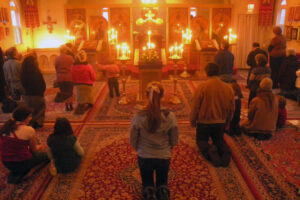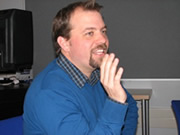James K.A. Smith, professor of philosophy at Calvin College, wrote “Redeeming Ritual” which was published in The Banner (February 2012). In the article Prof. Smith points to the beneficial results of having ritual in our lives. He notes that while Protestants tend to shun rituals in church, they embrace rituals outside the church. Rituals in the form of routines and disciplines are needed if we are to achieve excellence in activities like golf or playing Bach.
He draws our attention to the formative aspect of rituals:
In all of these cases we intuit that rituals are not just something that we do; they do something to us. And their formative power works on the body, not just the mind. So why should we be allergic to ritual when it comes to our spiritual life? Could we redeem ritual?
He notes that rituals do exist in Reformed worship. Moreover, these rituals are beneficial to Reform worship. He notes of the practice of standing during the Scripture reading and saying “Thanks be to God” at the end of the reading:
You might say it without thinking about it. But that doesn’t mean it’s not doing something. That little ritual trains your body to learn something about the authority of God’s Word, and to respond in gratitude.
He appeals to a holistic understanding of human nature. We are “embodied beings,” not “brains-on-a-stick.”
We need not be afraid of ritual. If we appreciate that God created us as incarnate, embodied creatures, then we will recognize his grace lovingly extended to us in ways that meet us where we are: in the tangible, embodied practice of Spirit-charged rituals.
These are thoughts that an Orthodox Christian can readily agree with. As a Protestant convert to Orthodoxy this describes well my experience of the Divine Liturgy and Orthodox prayers. Orthodoxy is rich with elaborate, theologically profound prayers. By repeating these prayers sincerely I was learning from the great spiritual classics of ancient Christianity. Rituals like crossing myself and bowing gave me a sense of participation, and the sense I was taking part in the same worship as the early Christians.
Protestants and the Sign of the Cross
Prof. James K.A. Smith’s article provides an alternative viewpoint to Pastor Doug Wilson’s claim that it is inappropriate for Protestants to make the sign of the cross. His article shows that there are good reasons to bring back ancient rituals like the sign of the cross. If there is a missing element to Prof. Smith’s article it is how historic rituals, as opposed to invented rituals, can connect one to the past. Being rooted in the past and having a well grounded Christian identity is needed for spiritual maturity in today’s vertiginous religious climate. The biggest threat today is not the empty ritualism of works based salvation but belonging to a church tradition that has become unmoored due to its disavowal of rituals and historic worship.
However, Prof. Smith is not unaware of the need for historic worship as evidenced by another article of his: “Tradition for innovation” which appeared in Faith & Leadership (June 2012). In it he argues that if evangelicals wish to minister to a broken world outside the church and engage in “culture making,” they first need to be grounded in the historic Christian worship and faith. He writes:
In short, we cannot hope to restore the world if we are constantly reinventing the church; the hard work of innovation requires grounding in a tradition.
We cannot hope to re-create the world if we are constantly reinventing “church.” Instead, we will reinvent ourselves right out of the story. Liturgical tradition is the platform for imaginative innovation.

“Why all the Rituals” by Michael Bressem, Ph.D.
Evangelicals and Protestants are becoming aware that Christianity is more than just a theological system but also a worldview and a way of life. There is a hunger for a holistic approach to being a follower of Christ and living out the Christian faith in the world. Many have started investigating the early church fathers and the historic liturgies in an attempt to be grounded in a faith tradition that does not drift with the ebb and flow of modern culture.
They are also grappling with the fact that far from being “brains-on-a-stick,” we are embodied beings and that what we believe in our hearts needs outward bodily expression like rituals. This explains why there is this increased interest in rituals like the sign of the cross and liturgical worship among Reformed Christians. But sooner or later they will have to ask themselves: How far do we want to go? Half way or all the way? Some Protestants have gone all the way and crossed the Bosphorus.
Robert Arakaki
Note: All emphasis in quotations have been inserted by me and not part of the original text.

As a former Elder in the Christian Reformed Church, I should say that the CRC as a denomination is only equivocally “Evangelical.” I entered it for doctrinal reasons, aware that I was putting myself far outside the Evangelical mainstream, if not outside Evanglicalism altogether, by rejecting Dispensational Premillenialism (which conscious Calvinists strongly tend to reject).
Further, it always seemed to me that Calvin College stands toward the “high Church” end of the CRC spectrum.
(I love “brains-on-a-stick,” by the way. That’s a keeper.)
Reader John is absolutely correct. Most traditional, old-school Reformed Churches who take their Calvinism seriously see a clear separation between themselves and what’s normally called ‘broad-evangelicalism’ (sometimes even ‘evanjellyfish’ to playfully scorn their laditudinarianism). What is presently interesting and more on topic, is it’s these Churches who now most apt to borrow (tweak & embrace as their own) and introduce extra-biblical traditions from history, into their worship and praxis. Granted, some still insist on being their traditional, austere “brains-on-a-stick”, following more traditional “Regulative Principle”. But it’s been said many times that “theology follow practice” so we should expect to see these Churches either bleed sola scriptura to death with a thousand cuts (exceptions), or so re-define the Regulative Principle that it allows for all manner of Liturgical Ritual which, of course, is “not required or binding, just helpful.” Others will increasingly see the impoverished “brains-on-a-stick” anthropology and community, and ad fontes…look back to the sources in the historic Church.
This is some very good stuff. Thanks for introducing me to James Smith!
I will play devil’s advocate though and question that we’ll be lead to ask “How far do we want to go? Half way or all the way?”. I would suggest many won’t view it as a transition but an inclusion of old practice into current theology. I think what Smith is pointing out is spot on, these rituals don’t by nature contradict the reformed traditions or theology. They can be simply added without a departure of theology.
The question you are asking would go beyond that. It would be a Protestant asking if they want to depart from their theology to adopt the principles, rituals and theology of the early fathers. And I’m not sure that question will get asked that often.
Great article. Great food for thought.
Hi Joshua,
Welcome to the OrthodoxBridge! I’m glad you liked the article. I’ve heard good things about James Smith and his advocacy of ‘radical orthodoxy.’
I don’t think a lot of people will ask questions about how far to go with appropriating the church fathers, but I’m sure some will be pondering that question. It’s something that haunted me for several years before I became Orthodox. And it’s something that people should be asking. In my opinion dabbling with early church practices can be risky for Reformed Christians. I noted in an earlier posting that making the sign of the cross was something the Reformed tradition opposed. I’ve also noticed an increased openness among Evangelicals and Reformed Christians to icons. Personally, I’m happy to see this interest in icons, but at the same time I also want them to understand the significance of using icons for prayer. I’m sure you and I would rejoice if a non-Christian friend were to start reading the Bible to learn more about who Jesus is but would be perturbed if this friend were ‘believe’ in the Bible and use the best parts of the Bible for his religion. The Bible is an integral part of Christianity and cannot be isolated apart from the Church. I recently met a lady who claimed to be “spiritual” taking the best from all the religions out there. The danger of eclecticism is that one has no firm tradition to stand on. And to quote Augustine of Hippo: “If you believe in Gospel what you like, and disbelieve what you don’t like, it is not the Gospel you believe in but yourself.” It was when I realized that Protestantism had no firm parameters that I realized that Orthodoxy’s Tradition provided what I was looking for. It was an issue of theological, spiritual, and ecclesial integrity.
Thanks for sharing your thoughts. Here’s my two cents.
Robert